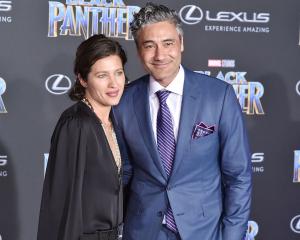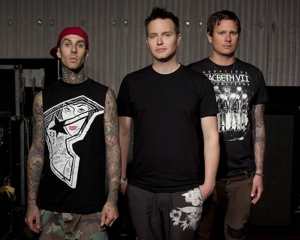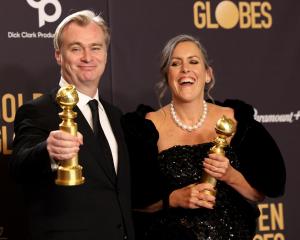The premise of Nurse Jackie sounds inherently dark: Edie Falco plays a pill-popping emergency room nurse combating the dysfunction of a chaotic big-city hospital.
There was little somberness in evidence on a day in February as Falco shot a short scene with co-stars Peter Facinelli and Merritt Wever on a soundstage in Queens, New York.
As the actors recited the brief dialogue, the producers and crew tried in vain to stifle their laughter.
The chuckling began as Facinelli, as the love-struck young Dr Fitch Cooper, approached the nurses' station and presented Falco's Jackie Peyton with an offering of pink roses and a pack of gum.
"No", Jackie said exasperatedly.
"Don't".
Then Wever, the wide-eyed novice nurse Zoey Barkow, did a double-take as a patient was wheeled past them.
"Oooh, it's the movie critic from Good Morning New York," she squealed, bouncing up and down so vigorously that her long brown hair came loose from its braid.
Guffaws filled the room.
"I can't wait to see that on TV," executive producer John Melfi said with a grin, peering at the scene on a monitor.
As the latest television series to embrace the dramedy genre, Nurse Jackie balances the crises that Jackie confronts with bursts of drollness.
The character shares some of the dark humour and steeliness of Carmela, the mob wife Falco played on The Sopranos, a part that garnered her three Emmys and made her a sought-after lead once the drama finished its run in 2007.
But the comedy required in the role represented a new foray.
The actress said she was open to doing another television series but at first had trouble finding the right project.
"For a while I thought, well, maybe I just don't want to work anymore, or work now, because nothing was appealing to me," she said during a break between scenes, perched in a director's chair in blue scrubs.
"It actually was a little nerve-racking.
"But I read this and I thought, `Here's something'."
Falco was fascinated by Jackie's "very opinionated, very tough" demeanour, but was initially apprehensive about the series' comedy elements.
"I kind of felt like that was for other actors, that that was never my thing, maybe because I wasn't ever cast that way," Falco said.
"The idea that this was going to be overtly funny - I wasn't sure that was where I wanted to go.
"I just don't have the instincts in that regard."
But Falco quickly adjusted to the series' quirky, deadpan tone.
"She's one of the funniest people I've ever met," said executive producer Linda Wallem, who serves as the programme's show runner along with executive producer Liz Brixius.
"She just doesn't believe it.
"And what is amazing is to have somebody that funny who also has such gravity.
"It's the most powerful, wonderful thing to watch."
Blunt and acidic, Jackie harbours secrets from those around her, including her addiction to pain medication.
But as she wrestles with her weaknesses, she also ekes out her own brand of vigilante justice at the hospital.
"She's got her own moral code," Brixius said.
"There's definitely right and wrong with her, but it's not the same as yours and mine.
"And it's a little bit like Dirty Harry: `At the end of the day, I'm just going to make sure that justice is done'."
One episode involves a paedophile and catheter "and that's all I'm going to say", Wallem added mischievously.
"There are going to be outrageous things on this show, but people are going to cheer.
The whole world is going to root for her."
Nurse Jackie has its origins in an encounter that executive producer Caryn Mandabach had with an emergency room nurse.
Struck by her stories, Mandabach asked her to keep a journal, which then turned into a script.
Falco and her manager, Richie Jackson, read the pilot, but initially passed on it.
A year later, Showtime Entertainment president Bob Greenblatt was courting Falco to come to the network, and Jackson remembered that the actress had been intrigued by the nurse character.
Greenblatt tapped Wallem and Brixius to take on the project.
They reworked the script in 10 days, fashioning Jackie as a flawed Robin Hood figure.
Both were determined to keep the series centred on a nurse's perspective, soliciting anecdotes from real nurses to keep the show grounded.
"Nurses are the ones with the best stories," Brixius said."
As writers, we can relate to nurses, because we're always the ones who are behind the scenes."
While the narrative centres on Jackie's life at the hospital, the series seeks to stand out from other medical dramas.
"It's the anti-ER/Grey's Anatomy," Wallem said.
It's trickier for a concept like Jackie coming in the wake of ER, Wallem said, "because there's so much drums and dramas and craziness - and the truth is, that's not how it is."
Instead, the drama of the show is built into the ethical choices that Jackie is forced to make about her patients and her family.
Complicating everything is her addiction to pain medication.
"There are massive consequences to addiction, that in order to keep using, you have to keep rationalising and tell yourself a different story and underplay the damage that you're doing, and that is the interesting part of Jackie," Brixius said.
"And it's also where a lot of our comedy comes from.
"It's not that it's funny; it's that it's absurd." Matea Gold












